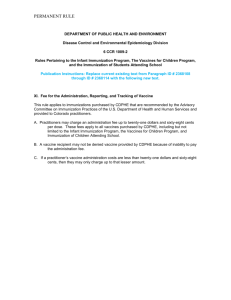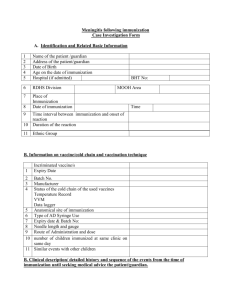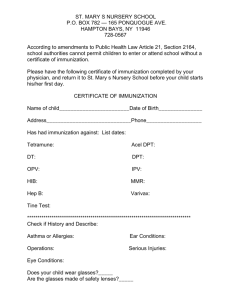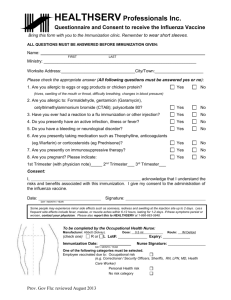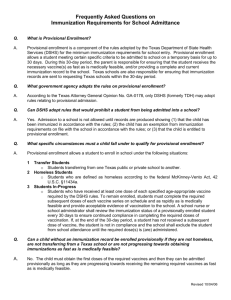Meeting Minutes – February 19, 2009 Participants
advertisement
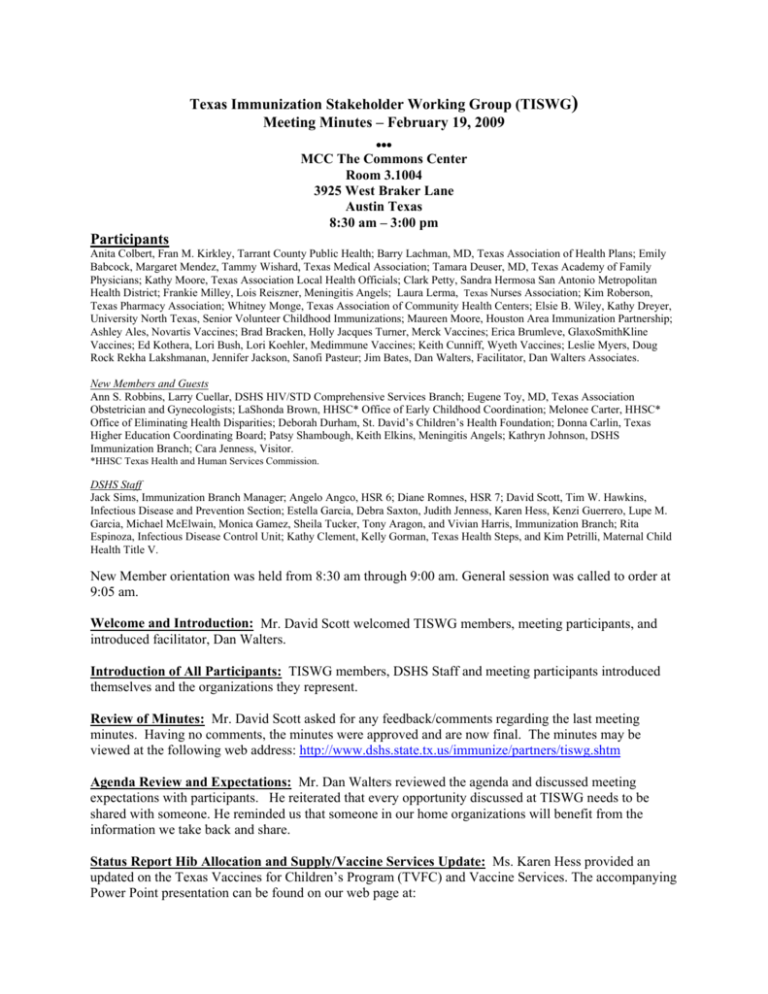
Texas Immunization Stakeholder Working Group (TISWG) Meeting Minutes – February 19, 2009 … MCC The Commons Center Room 3.1004 3925 West Braker Lane Austin Texas 8:30 am – 3:00 pm Participants Anita Colbert, Fran M. Kirkley, Tarrant County Public Health; Barry Lachman, MD, Texas Association of Health Plans; Emily Babcock, Margaret Mendez, Tammy Wishard, Texas Medical Association; Tamara Deuser, MD, Texas Academy of Family Physicians; Kathy Moore, Texas Association Local Health Officials; Clark Petty, Sandra Hermosa San Antonio Metropolitan Health District; Frankie Milley, Lois Reiszner, Meningitis Angels; Laura Lerma, Texas Nurses Association; Kim Roberson, Texas Pharmacy Association; Whitney Monge, Texas Association of Community Health Centers; Elsie B. Wiley, Kathy Dreyer, University North Texas, Senior Volunteer Childhood Immunizations; Maureen Moore, Houston Area Immunization Partnership; Ashley Ales, Novartis Vaccines; Brad Bracken, Holly Jacques Turner, Merck Vaccines; Erica Brumleve, GlaxoSmithKline Vaccines; Ed Kothera, Lori Bush, Lori Koehler, Medimmune Vaccines; Keith Cunniff, Wyeth Vaccines; Leslie Myers, Doug Rock Rekha Lakshmanan, Jennifer Jackson, Sanofi Pasteur; Jim Bates, Dan Walters, Facilitator, Dan Walters Associates. New Members and Guests Ann S. Robbins, Larry Cuellar, DSHS HIV/STD Comprehensive Services Branch; Eugene Toy, MD, Texas Association Obstetrician and Gynecologists; LaShonda Brown, HHSC* Office of Early Childhood Coordination; Melonee Carter, HHSC* Office of Eliminating Health Disparities; Deborah Durham, St. David’s Children’s Health Foundation; Donna Carlin, Texas Higher Education Coordinating Board; Patsy Shambough, Keith Elkins, Meningitis Angels; Kathryn Johnson, DSHS Immunization Branch; Cara Jenness, Visitor. *HHSC Texas Health and Human Services Commission. DSHS Staff Jack Sims, Immunization Branch Manager; Angelo Angco, HSR 6; Diane Romnes, HSR 7; David Scott, Tim W. Hawkins, Infectious Disease and Prevention Section; Estella Garcia, Debra Saxton, Judith Jenness, Karen Hess, Kenzi Guerrero, Lupe M. Garcia, Michael McElwain, Monica Gamez, Sheila Tucker, Tony Aragon, and Vivian Harris, Immunization Branch; Rita Espinoza, Infectious Disease Control Unit; Kathy Clement, Kelly Gorman, Texas Health Steps, and Kim Petrilli, Maternal Child Health Title V. New Member orientation was held from 8:30 am through 9:00 am. General session was called to order at 9:05 am. Welcome and Introduction: Mr. David Scott welcomed TISWG members, meeting participants, and introduced facilitator, Dan Walters. Introduction of All Participants: TISWG members, DSHS Staff and meeting participants introduced themselves and the organizations they represent. Review of Minutes: Mr. David Scott asked for any feedback/comments regarding the last meeting minutes. Having no comments, the minutes were approved and are now final. The minutes may be viewed at the following web address: http://www.dshs.state.tx.us/immunize/partners/tiswg.shtm Agenda Review and Expectations: Mr. Dan Walters reviewed the agenda and discussed meeting expectations with participants. He reiterated that every opportunity discussed at TISWG needs to be shared with someone. He reminded us that someone in our home organizations will benefit from the information we take back and share. Status Report Hib Allocation and Supply/Vaccine Services Update: Ms. Karen Hess provided an updated on the Texas Vaccines for Children’s Program (TVFC) and Vaccine Services. The accompanying Power Point presentation can be found on our web page at: http://www.dshs.state.tx.us/immunize/partners/tiswg.shtm (1) • Topics included in this update are as follows: o TVFC provider enrollment increases o National Immunization Survey (NIS) results with the adaptation of the new vaccines added to the national survey measurements o Vaccine purchases and losses update 2006-2008 o Adolescent Vaccinations; vaccines available through TVFC program o Vaccine shortages and new vaccines o Upcoming TVFC site visits o Electronic Vaccine Accounting (EVA) – Centers for Disease Control and Prevention (CDC)’s new vaccine ordering system; benefits and steps to implement process o A new policy on non -compliance with the ordering and distribution of vaccines to reflect CDC standards is underway. National Observances/Education Opportunities: Ms. Lupe Garcia introduced the 2009 National Immunization Observances/Education Opportunities. She discussed the overview and goals of the National Awareness dates and the expectations DSHS wishes to establish for these observances. (2) o National Infant Immunization Week, April 25 – May 2, 2009 o National Immunization Awareness Month, August 2009 o National Adult Immunization Awareness Week, September 27 – October 3, 2009 o National Influenza Vaccination Week, December 2009 The Public Information Education and Training section staff has developed resource materials with suggestions to assist stakeholders in developing, coordinating, acknowledging and evaluating the upcoming Immunization Awareness efforts across the state. See attached handouts for more specific information and to access the resource materials developed for the campaigns. ImmTrac Program Update: Mr. Michael McElwain gave an overview of the ImmTrac program’s improvement since 1995. ImmTrac began tracking Childhood Immunization Records in 1995. Currently, 73 million shots are recorded concerning 5.8 million Texas children. The accompanying Power Point presentation can be found on our web page at: http://www.dshs.state.tx.us/immunize/partners/tiswg.shtm (3) • • • • ImmTrac generates 109,000 immunization history reports each month. Hurricane Ike had a great impact on the 2008 registry services. o We recognized how many families were moved out of harm’s way during this catastrophic event. One of the most substantial results was to increase in Texas schools enrollment into ImmTrac. o First Responders were added to ImmTrac during the Hurricane Ike Disaster Response. Currently ImmTrac has 200 first responders registered. o SB-346 and SB-347 were directly related to the expansion of ImmTrac during disaster response. Louisiana established this qualifier after Hurricane Katrina. ImmTrac Provider Working Group (IPWG) was established in November 2005, in collaboration with the Texas Medical Association (TMA) and Texas Pediatric Society (TPS). Its purpose was to discuss ImmTrac issues which effect private providers and Health Plans. Continuation of this working group is to be determined. Working goals and challenges include: o On-line Consent - ImmTrac remains an ‘opt-in’ system, which means parents must sign a consent form in order to be registered. o Inability to access the DSHS web-page to obtain a child’s vaccination status. o Continued efforts to improve information systems in a collaborated effort through St. David’s Foundation and the Houston Area Immunization Partnership. 2 o o o o Continued improvements in the use of Recall/Reminder systems for providers and implementing new shot clinics. Conducted a series of Town Hall Meetings and presentations at the 2008 Immunization Summit in Austin. Forecasted priorities include improved data exchange and data quality. Promotion of the Education & Training to providers, Emergency Response Teams, as directed by SB11 which mandates Emergency Management Response for the future. Virtual Town Hall Meeting/Working Lunch: All participants Topic: Vaccines-Wading through the Confusion! A virtual Town Hall meeting with a panel of experts sponsored by the Public Health Café. A pre- recorded video was shown online followed by a virtual town hall meeting with an opportunity to dial in with questions. Our very own TISWG member Mrs. Frankie Milley was part of the illustrious panel. Panel members are as follows: Lars Ullberg, MA - Center for the Advancement of Distance Education (CADE) University of Illinois, Chicago- Moderator David Amaral, PhD - Professor of Psychiatry and Behavioral Sciences, Research Director and Beneto Foundation Chair, The M.I.N.D. Institute University of California, Davis S. Michael Marcy, MD - Clinical Professor of Pediatrics, USC and UCLA Schools of Medicine, Los Angeles, CA Frankie Milley - Founder, Meningitis Angels, Porter, TX http://www.meningitis-angels.org/ Rahul K. Parikh, MD, FAAP - Dept. of Pediatrics and Adolescent Medicine, DSA Chief of Patient Education, Kaiser Permanente Med. Ctr., Walnut Creek, CA http://www.rahulkparikh.com Stephen M. Perle, DC, MS, FICC - Professor of Clinical Sciences, University of Bridgeport, College of Chiropractic, Bridgeport, CT, consulted on ethics to a variety of organizations. Kenneth Reibel - Autism News Beat, Milwaukee, WI http://autismnewsbeat.com/ Mark Sawyer, MD - Professor of Clinical Pediatrics and Pediatric Infectious Disease Specialist, UCSD School of Medicine, San Diego, CA Kristine Sheedy, PhD - Associate Director of Communication Science, National Center for Immunization and Respiratory Diseases, Centers for Disease Control and Prevention Message Mapping/Risk Communication: Ms. Lupe Garcia introduced the concept of Message Mapping as a science-based method to communicate to constituents’ information of high concern, emotionally charged, and controversial, such as issues of vaccines and vaccine safety. • Three handouts accompanying this topic are attached. 1). Risk Communication Templates; 2). Crisis: Emergency Risk Communication; 3). Power Point Presentation on Message Mapping/Risk Communication. See attached handouts for more specific information. • Highlighted aspects of this presentation included Principles of Risk Communication, Creating a Message Map, Mental Noise Theory, Trust Determination Theory, and Negative Dominance Theory. Ms. Garcia provided tips to remember when creating message mapping for difficult topics. Please see handouts for additional pointers and examples of message mapping. (4) Partnership Input Discussion: Ms. Vivian Harris led a brief discussion on expanding partnerships across the state. Questions were proposed to TISWG on how this could succeed. Would a TISWG model be feasible? Some participants voiced their concerns for having varying needs across the state. Another strong collaboration is having difficulty in getting buy in from professional physician groups. Yet others voiced volunteers have been their strongest working advocates in their associations. It was decided that a mini survey be sent to explore what tools and strategies would be useful in building stakeholder groups around the state. Mr. Walters summed up the discussion with 1). Local ownership is needed, 2). Improved communications as to what is expected and how it is to be delivered and 3). To brainstorm what we can do collectively that we could not individually accomplish in isolation. 3 • Next Steps: Ms Harris is to send a mini survey to TISWG members to identify strength and challenges we could face expanding this development. Legislative Update: Mr. Jack Sims gave updates on the current Legislative Bills pertaining to Immunizations during this session. To date there are 18 bills with additional bills to be added. The Bills associated with Immunizations are posted on the Legislative Web-site. See attached handout for specific information. (5) • Two of the primary bills going forward are SB11 associated with First Responders, and SB 347 associated with the receipt and release of immunization information by the immunization registry in connection with a disaster. Each bill is currently of national interests as they affect neighboring states in the event of a disaster. Branch Update: Jack Sims gave the following updates. • Breaking News! Texas will be recognized as the most improved state according to the National Immunization Survey, at the 43rd National Immunization Conference in Dallas, Texas at the end of March. • The Rules package for revisions of the school requirements that will align more with the Advisory Committee of Immunization Practices (ACIP) and Centers for Disease Control and Prevention (CDC) recommendations for school entry was signed by the Texas Health and Human Service Commissioner Albert Hawkins. On March 5th they will be posted in the Texas Registry for the required 20 days and then posted as approved. • The Immunization Branch continues to support the strategies to raise vaccination coverage levels. These include the nationally known best practices of: o Use of Registries/ImmTrac o Promote Provider Education/ Public Education o Encourage and Promote the Medical Home o Use of Reminder Recall Systems o Using Partnerships to Improve Strategies New Items/Next Steps: The next two TISWG meetings are scheduled for: o May 21, 2009 o August 20, 2009 o Locations to be determined. Meeting Evaluation: All Participants Negative comments Included: o Need larger room, Not so cold, Want coffee available, Too passive – Need more interaction, No Chat available on the Web cast. Positive comments included: o Good lunch, Good turnout, Presentations were clear, Good diversity, Orientation was good. Adjourn: The meeting adjourned at 3:15 p.m. Attachments/handouts: (1) Vaccine Services PPT (2) Public Information Education and Training handouts (observances) (3) ImmTrac PPT (4) Public Information Education and Training (message mapping) (5) Legislative Update 4
